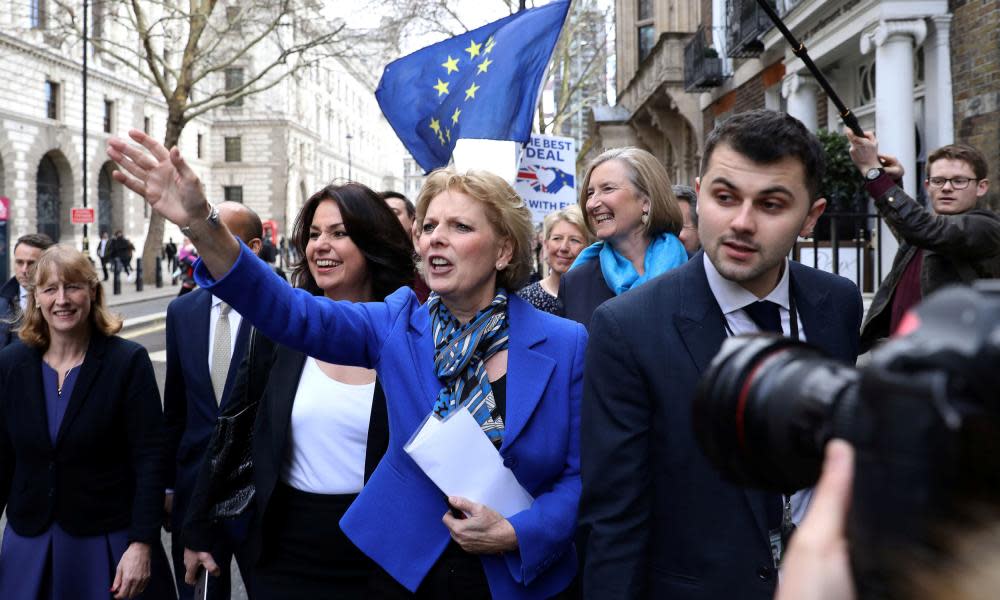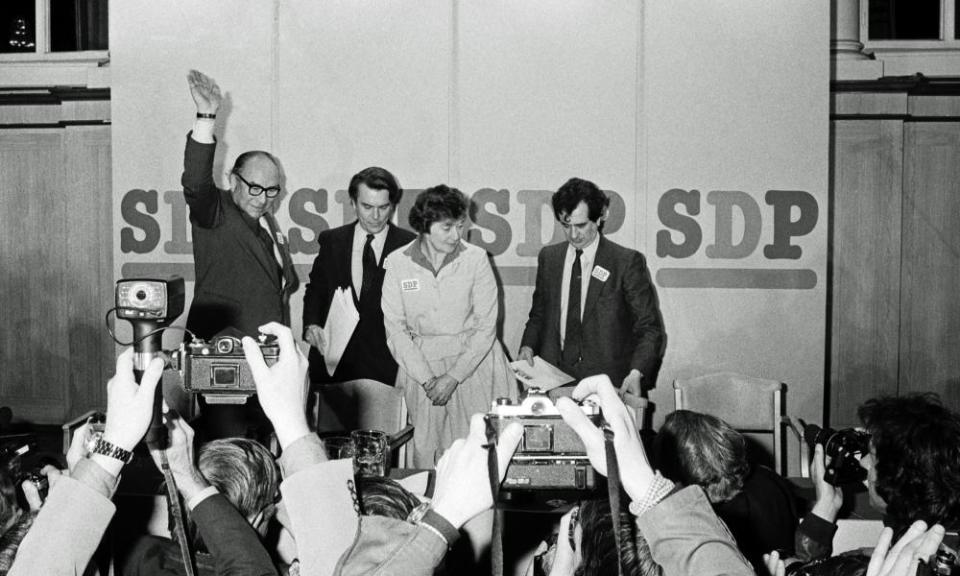The breakaway MPs are like a tribute act to the failed politics of the past

If any breakaway “centrist” party was going to thrive, it was the Social Democratic party. Their founder members were political titans: David Owen, a former foreign secretary at the age of just 38; Shirley Williams, one of Labour’s most prominent women, an education secretary who fronted party political broadcasts; Roy Jenkins, a chancellor, deputy leader, president of the European commission and once a likely future leader.
They had gravitas, intellectual heft – Jenkins was a prolific author – and a body of ideas. They received adulation in the media. At the end of 1981, one Gallup poll gave them an astonishing 50.5% of support, light years ahead of both the Tories and Labour. “Go back to your constituencies and prepare for government!” David Steel, leader of the SDP’s Liberal allies, triumphantly told his activists. And yet, a year later, the SDP-Liberal Alliance and political reality collided: it achieved 25.4%, a decent share for a new political party, but under our electoral system that delivered just 23 seats. Even though Margaret Thatcher’s Tories had lost half a million votes compared with 1979, her party won a landslide and were free to transform Britain with ruinous social consequences.
The new Independent Group – a holding title for a nascent party that sounds like an insurance firm – makes the SDP look like an exercise in political genius. None of their founders have national stature; they are an intellectual black hole, devoid of a coherent set of ideas; their first few days in existence have been shambolic. Yes, they will enjoy a protracted political honeymoon. The new movement is a blank canvas on which voters can project anything they want; and those, understandably, most angry about Brexit can register their frustration. But it’s not simply the fact that a simple political fundamental will reassert itself – that first past the post means the choice at the next election will either be a Tory or a Labour government. It’s that – quite unlike Labour’s opponents the 1980s, this group is an anachronism.

In the 1970s the postwar social democratic settlement was collapsing. Economic crisis, triggered in part by a huge oil price shock, triggered social crisis, including mass strikes over living standards. A new right, which had spent three decades laying the intellectual foundations for a resurgence when an opportune crisis came along, framed the turmoil as caused by excessive collectivism and an overbearing state. Disillusionment with nationalisation – because Labour had disastrously opted for rule by bureaucrats rather than democratic public ownership – was real. According to an influential leftwing magazine, Marxism Today, “new times” had emerged in which the old industrial working class had gone; and, while the right understood Britain was “living in a new era”, the left did not.
It is certainly true that 1980s Labour, riven with bitter splits, failed to present a radical alternative in a way that resonated with the political moment. Thatcher and her individualism had a populist appeal. When she triumphed in 1983, she did so with a decisive lead among voters aged between 18 and 24. The SDP was a repository for those with no desire for a radicalisation of the postwar social democratic order.
We live in our own “new times”, in which following the financial crash that discredited market liberalism and led to a decade of stagnating living standards, we crave security we don’t have, whether it’s because of the housing crisis, a lack of well-paid stable jobs, or crumbling public services. This is not an age of disillusionment with privatisation: polls show overwhelming support for public ownership. The notion of “what is good for the rich is good for us all” lies shredded; that’s why public support for hiked taxes on the rich is so decisive. This is the real centre-ground of public opinion, and that’s why the new group isn’t “centrist” but the proponent of fringe ideas.
The founders of the IG are all at odds with our “New Times”. Chuka Umunna is no fan of taxing the rich ; Chris Leslie passionately backed the welfare cap and limiting child tax credits to two children. The new Tory defectors all voted to slash and privatise public services, to cut benefits for the disabled and low-paid, to introduce the bedroom tax, to reduce taxes on the rich and to treble tuition fees. After defecting, Anna Soubry declared that “the coalition government did a marvellous job” and that austerity was “absolutely necessary and I don’t have a problem with that”.
The new group is the Cameron-Clegg coalition resurrected: pro-market dogma with a splash of social liberalism, and even that’s questionable. Umunna has indulged anti-immigration rhetoric , called for leaving the single market to end freedom of movement, and validated benefits-bashing by arguing Corbyn wanted to give “more generous social security payments for people who can work but refuse to work.” Gavin Shuker did not vote for equal marriage, a fact which should rightly upset LGBTQ people. Angela Smith decribed BME people as “funny tinged”. Tory defectors voted for their government’s draconian anti-migrant policies, which led, of course, to the Windrush scandal.
If there is a huge appetite for a centrist realignment of politics then it is difficult to answer why the combined share of the two main parties reached the highest level for nearly half a century in 2017, why Labour enjoyed the biggest vote surge since 1945, and why the Liberal Democrats flatlined at a historic low. That doesn’t mean complacency from Labour. It’s possible to rebut the smear that Corbyn or the Labour party as a whole are antisemitic, while arguing there needs to be more decisive action from Labour on tackling the antisemitism of a minority. It cannot simply take for granted the votes of those remainers for whom Brexit is a key priority. Labour’s abandonment of the principled case for migration is depressing, too.
Expect an extended honeymoon for this political formation. But, sooner or later, two things will happen. First, the nation will have to choose between a Tory government in which Jacob Rees-Mogg’s hard right is in the ascendancy, and an anti-austerity Labour government opposed to a hard Brexit. Second, the new movement will have to be clear about its political agenda. And when that happens, one thing will be abundantly clear: here is a group of MPs completely at odds with the times in which we live.
• Owen Jones is a Guardian columnist

 Yahoo News
Yahoo News 
